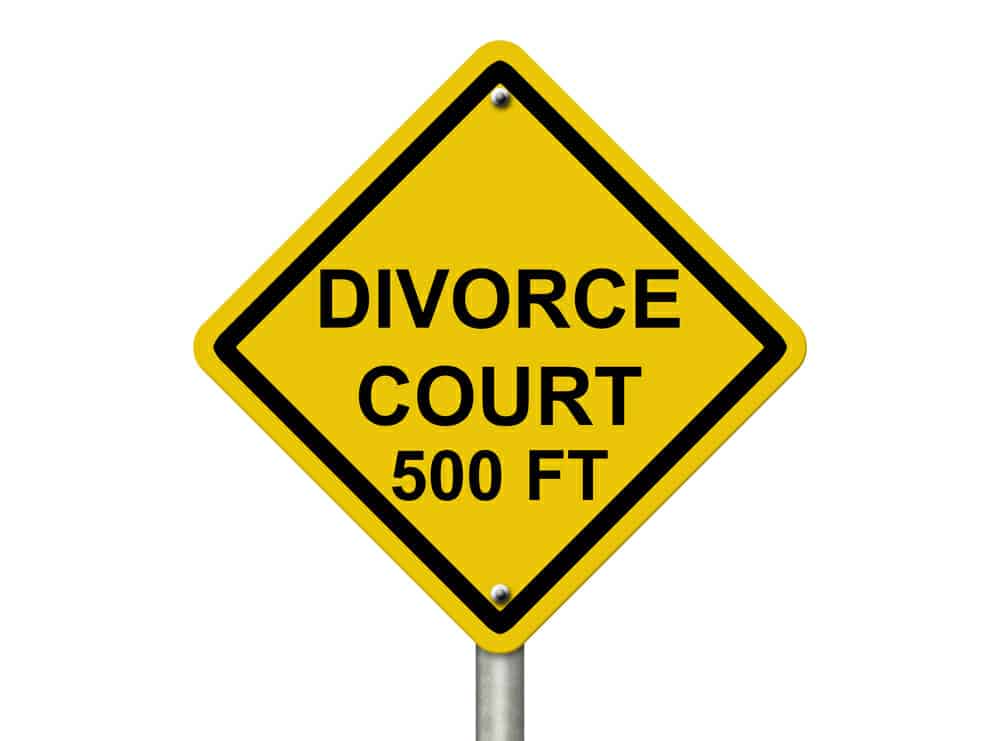The courtroom is packed. Lawyers are milling around the front of the room, waiting for the judge. Some ooze confidence. Most are stressed. A few look bored. Outside the low wooden gate that separates the lawyers and the judge from the rest of the world, nervous litigants pack the wooden benches – the “hard seats.” No one is happy. But then again, this is divorce court. No one is ever happy.
In spite of their pain, or maybe because of it, thousands of couples fill divorce courts and zoom courtrooms all across the country every single day. They are all there for one reason: to get divorced.
Or at least that’s what you might think.
As always, the truth is more complicated than that.

Why People Go to Divorce Court
If the only reason that people went to divorce court was to get divorced, you would be able to shoot a cannon down the hallway of most courthouses and not hit anyone. They would be that empty.
It's not that the people in divorce court don’t want to get divorced. Most do. It's just that getting divorced doesn't really take that long.
The actual hearing required to get divorced usually takes around 15 minutes. Even in the most complicated cases, an uncontested divorce hearing rarely takes more than an hour -- IF everything is agreed.
The problem is that in most cases, everything is NOT agreed. Or at least, it’s not agreed until the very end of the case.
(Even though upwards of 90% of all divorce cases ultimately settle, MOST divorce cases involve some amount of fighting during the divorce process.)
The truth is, people go to divorce court for a variety of reasons – most of which have nothing to do with actually ending their marriage.
Some people go to divorce court because they want to fight. They are angry and upset. Fighting in court will make their spouse angry and upset. Score!
Other people go to court because they think that’s just what you do when you get divorced. Or they go because their lawyer tells them they need to go.
Still other people go to divorce court because they want the chance to tell the judge their story. They don’t realize that, even if they do go to court, they will never be able to tell the judge their story. That's not how the divorce court system works.
But, no matter what anyone's reason is for going to court, everyone expects the same thing when they get there: Justice.
Yet the idea that you will find something called “justice” in divorce court is the biggest divorce myth there is.
The Truth About Divorce Court
Contrary to what most people think, divorce courts don’t necessarily exist to dispense “justice.”
They exist to divorce people. Period.
It’s not that you can’t get justice in divorce court. (Although there are those who would argue that that’s true.)
It’s just that “justice” means a lot of different things to different people.

For example, your idea of what “justice” is will usually be very different than your spouse’s idea of what justice is. Your divorce lawyers have their own ideas about justice. So does the judge.
Because of that, a decision that YOU think is just or fair, will likely feel like it’s very UN-just and unfair to your spouse.
Trying to find something that everyone agrees is “justice” is often impossible.
Of course, a lot of cynics – or people who have gotten the short end of the stick in an ugly divorce -- would say that there is no justice in divorce court. They will tell you that the court system is broken and that the judges are corrupt. I disagree.
Our court system is definitely overcrowded and underfunded. But, the reason that the divorce court system doesn’t hum along as perfectly as a jet engine on a 747 is not because the system is broken. It's because we are expecting a legal institution to solve family problems like a social service agency.
That's not what the legal system was designed to do.
It’s unrealistic to expect judges to sit like Solomon and provide “justice” to an endless parade of warring spouses who can’t agree on what time of day it is. While most judges do their best, at least one angry spouse is always going to feel like the judge’s decision was unfair.
The bottom line is that “justice,” like beauty, often lies in the eye of the beholder.

Do You Want Justice … or Do You Just Want to Win?
Another problem with looking for “justice” in divorce court is that most people who go there don’t necessarily want “justice.” What they want is THEIR version of justice.
In other words, they want to win.
But when one person wins, the other loses. That’s just the way the court system works. That’s also why staying OUT of court gives you significantly more opportunities to resolve your divorce issues in a way that allows both you AND your spouse to win.
When you use an out-of-court alternative to settle your divorce case (i.e. you use mediation or Collaborative Divorce) you give yourself the opportunity to create a win-win situation, rather than a win-lose, or a lose-lose situation.
But What About “the Law?”
Many people believe that divorce law dictates everything that will happen in their divorce.
Yet, that’s another divorce myth.
Contrary to what most people think "the law" is not written in stone. The law changes all the time.
What’s more “the law” (especially divorce law) was actually designed to be flexible. It was written in a way that gives divorce judges a lot of discretion. That discretion allows them to make decisions not only based on the law, but also on their interpretation of the law.
The positive side of that judicial discretion is that it allows judges to make decisions that make sense in all kinds of different cases. It avoids the draconian results that can happen when the law is too rigid and strict.
The negative side of judicial discretion is that no matter how much you know “the law,” you can never be entirely sure how any judge will apply that law unless and until you go all the way to trial. That makes going to trial full of uncertainty … which is why going to trial should always be your last resort.

How to Get Justice in Your Divorce
If going to divorce court isn't about getting justice then why go to divorce court at all?
There are only two reasons:
- to finalize your divorce after you and your spouse have settled all of your issues (because only a judge can divorce you); or
- to get the judge to decide your case for you when you and your spouse can't resolve your divorce issues yourselves.
Going to court just to get the judge to sign off on your divorce is necessary. But it’s usually little more than a formality. It also leaves control of your life and your divorce in your hands.
Going to court to get the judge to decide your divorce issues places your life in the hands of a complete stranger. It robs you of any control over your family, your finances, or your future.
It will get you divorced. But it guarantees nothing about the terms of your divorce.
The bottom line is that, if you go to divorce court you want to be crystal clear about what you’re doing, and what you’re likely to get.
When you place your divorce in the hands of a judge, what you will ultimately get is a decision.
Whether that decision amounts to what you consider to be “justice,” however, is an open question.
If “justice” is what you’re looking for, the only way to get it is to resolve your divorce yourself.
Of course, if you do that, there will STILL probably be parts of your divorce settlement that seem grossly unfair to you. No one who goes through a divorce ever gets everything they want. But at least if you stay out of court you give yourself control over what you get.
Sometimes, in divorce, that’s really the best you can do.
_____________
This article was first posted on January 19, 2017 and updated on February 17, 2023


Karen
Fantastic information and so comforting as my angry wife even had her lawyer file to withdraw as she is determined to tell the judge how I ruined her life. even if she read your advice she wouldn’t buy it as everything is my fault. And she’s convinced the judge will agree even with our no fault divorce. Wow.
Thank you.
You’re welcome!
Judges arnt corrupt and being unfare. Do you live under a rock. You really haven’t done your home work. I could show you a case that you head would spin. So women don’t lie and make shit up, to keep the kids from the dad because their upset with the dad. The mom doesn’t use the kids as a pawn and the judge goes along with it. I would chew you up and spit you out. Dads kill themselves because of this. Go back under your rock.
I’m sorry you’re so angry.
Still standing in faith and waiting on the Lord to restore all we are losing – love my wife more than I ever have ,as I understand her heart now.
I am living in Texas. My wife filed for divorce, for Irreconcilable Differences. My wife made allegations that I want to kill my daughter and her and myself. My wife sister-in-law also made an Affidavit said the same thing like my wife allegations that I want to kill my daughter and her and myself. I have a daughter 2 and half years old. We both got an attorney. I don’t have any gun.
We went to the Court. The judge made decision that my daughter must resident in that house and every 48 Hours I have to move out that house and my wife move in that house to take care my daughter. And every 48 Hours my wife have to move out that house and I have to move in that house to take care my daughter. We are alternate. All bills in that house I have to pay half and my wife pay half. Since my wife filed for divorce, she moved out and living with her sister-in-law and her brother and her parents. So, every 48 hours she move out of our house, my wife have some where to live. But I don’t have where else to live every 48 hours. I have to live in shelter. It hard for me to live like that. Since she filed divorce and moved out, she keep my daughter for over 2 months. And her sister-in-law not allow me to she my daughter.
My question is: How the judge made decision that I can have my daughter every 48 hours, when my wife allegation that I want to kill my daughter, kill my wife and kill myself. And her sister-in-law made and Affidavit said same things.
Why The Judge did not believed it. How The Judge found out that it was and false allegation.
And in Court, I hear that The Judge said I can put her in Jail right now for hold my daughter over 2 months and don’t allow me to see my daughter.
It sounds like the judge decided in your favor. Be happy with that.
As far as why the judge decided the way that s/he did, I can’t say. It seems that the judge didn’t believe your wife. But, I wasn’t in court, and I didn’t talk to the judge, so I don’t know. If you want to know why the judge ruled as s/he did, you would have to ask the judge.
Best.
Karen
I am not able to ask the Judge(It is Impossible) and I am not able to ask the Attorney either (Because No moneys). That why I am asking You! And this is scare me
The Worst Thing A Woman Can Do In Divorce Proceedings – The Abuse Of Orders of Protection
http://www.huffingtonpost.com/liz-mandarano/the-worst-thing-a-woman-c_b_837636.html
I can understand that you are scared. I also understand that you don’t have any money. But you need legal advice, and I can’t give that to you online. I am also not licensed to practice law in Texas, so I can’t advise you on Texas law or court procedure.
Many attorneys offer free initial consultations. Schedule a consultation with a local attorney who can answer your questions. Even if you have to pay that attorney for an hour of his or her time, it will be worth it.
I’m sorry, but this is the best I can do for you under the circumstances.
Question about lying to the Judge in court.
My wife owner Nails Salon, with her Brother. She make good moneys. I am a Technician make only $17.50/Hourly.
In court, when the Judge ask her how much did she made a month, she lying to the Judge that she made only $2,000.00/monthly. After 5 minutes, The Judge made decision that I have to pay $200.00/Monthly for Child Support.
I did ask someone have been divorce before, they told me that they got same situation. The court system don’t have time to investigate.
So, a lot of of the Father are victims of the Court system. It was not fair for the Father when Join Custody and out there a lot of women still lying to the Judge in Court and still get away with it.
I’m sorry that you are in a bad situation. But here’s the truth: people lie all the time!
I hate to be the bearer of bad news, but it’s not the judge’s job to investigate your case. I’m not saying that to be mean. That’s just the way the system works. Investigating the facts is a lawyer’s job. So, either you have to hire a lawyer to do that for you (which it doesn’t sound like you have the money to do) or you have to do it yourself. You have to provide the judge with PROOF that your wife is lying.
The problem, of course, is that, even if you have proof that your wife is lying, the judge still may not believe you. That’s why going to court is so risky.
The truth is that most judges do their best to try to protect the children in divorce. They try to make sure that the children are being properly supported. Both parents have an obligation to support their kids, no matter how much, or how little, each parent makes.
If the judge in your case ordered you to pay more than the amount of child support than you think is right, you can get a lawyer and try to change that order. Or you can work on yourself and try to increase your job skills, and put yourself on a path where you can start making more money. Whether that is fair or not, I can’t say. But it will help you create a better life.
I know this might not be what you wanted to hear. Sorry.
Karen
“… it’s not necessarily the judge’s job to be fair…”
Yes. It is.
Divorce laws require a judge to do what is “equitable”. Equitable, by literal definition, means “fair”. So, it is necessarily a judge’s job to be fair.
All excellent points and the point of view of each participant creates the dynamic that is most challenging. Karen, as I read the article I couldn’t help but put a sports analogy to it. In your intro story, the judge said he’d be back in 30 minutes…that time was a FIXED number and the couple had to figure it out in that amount of time. In a sporting event (other than baseball which ends in 9 innings) there is a time-clock. If a law stood in place that limited divorce litigation/negotiation to say 1-3 months, stuff would get done, right? All parties (lawyers and divorcees, maybe even kids and outside parties) would find a way to play the game within the rules and expedite all the pain that takes place over time. In my case it went on two years longer than it really needed to…two years is a long time. As I’ve shared, I love your approach, great stuff!
You’re absolutely right. Two years IS a long time! … especially when you’re talking about two years of more pain! If the law required divorces to be done within a set period of time everyone in the system would find a way to work within those rules. They’d have no choice but to do so.
Of course, if we had hard and fast rules about how long things could last, there would also be situations where applying those rules in an absolute way would create tremendous hardships as well. There are always trade-offs.
Either way, the system is what it is at this point. The best thing anyone who is thinking about divorce can do is to PREPARE for what lies ahead. The more you understand how the system works BEFORE you get into it, the better chance you give yourself for getting to where you want to be at the end of it. And, if there’s any way you can stay out of divorce court – DO IT! That’s the best way to keep control of your life in your own hands.
Thanks for sharing your experience and insight!
Karen